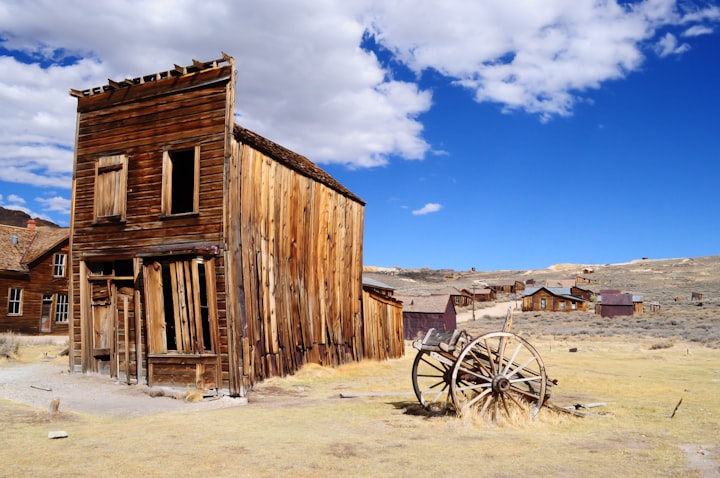
“Put your good boots on,” Sherah snapped, at her young brother. “Got us a bad man, needs t’ be kilt.” The boy answered to Kemuel; it was a Biblical name, as was her own. He was just turned ten, three years younger than his sister, and nearly as stubborn as she was. He rubbed his sleepy eyes and bounced upright in his bed, glaring in bewilderment and irritation.
A fateful day was begun — a day of judgment, of righteous wrath, in their New Mexico town, in the Christian year 1873. Why was he still sleeping?
“Cain’t we just do like Miss Paxton says? Sheriff, he thinks we ought to…” He struggled to recall the phrase, and came up with: “‘Keep our water’? We have to fetch it ourselves, no grownups? We’re just kids — ”
She grasped at his pajama bottoms, with both hands, eliciting a yelp of outrage from him. She was unimpressed, and not just because the first rays of sun were climbing the sky, above their outpost. “It’s ‘hold our water’,” Sherah cut in, “and if he could-a gone done this, we could sleep. Where them boots, Kem?”
The original name of the town, Signo de interrogación, had seemed a bit gruff, to Westward arrivals. Pleasing them, locals translated it: Question Mark.
“Sherah, stop that! Miss Paxton,” he said, “said we had to be good.” He liked Miss Paxton, their teacher. She noted when he got his reading and writing right, such as the time she stood before her young charges, at the one-room schoolhouse, and asked them to spot the name of their town, written on the blackboard.
The young woman had written just these basic symbols: a comma, a period, a question mark, an exclamation point, even a dollar sign. Kemuel had achieved a victory when he walked to the blackboard, and pointed out symbol number three, in that order; he became the teacher’s pet, for the afternoon. “Who’s his father’s son?” she said, with a twinkle he did not understand.
Ever since then, it was Miss Paxton this, and Miss Paxton that, till Sherah had wanted to scream: “She ain’t never gonna be our Ma,” and this was without a clue that Miss Paxton had a particular, hungry look in her gaze, whenever she aimed it at their father.
Yet — she was staying with them, on the edge of Question Mark, acting as their mindful guardian. Which, in turn, made her the chief obstacle to fulfilling Sherah’s mission — an ordinary act of retribution, starring a fellow of the Comanche tribe. Waking her would bring their plan to ruin.
The urchins had never known their mother, who had died from a fever, only a few months into her son’s lifetime. Their father, Malachi, had not been seen in town since he had set out, one morning, on his mysterious errand with the man his daughter since wished to see dead.
Sherah crept into their father’s room, reached under his bed to grasp the butt end of the weapon — a .50-caliber, Spencer 1865 repeating carbine. Kemuel’s eyes bugged out wide, at the sight of her, wielding the rifle; she was too focused on the task ahead to notice.
Almost a walking dust mote, he had no time to bathe first, or to eat first. Justice would not wait for breakfast.
^^^^
Twenty-six years earlier, a man named Charles Bent had been ambushed, and subsequently, killed in the Taos Revolt. Not just any man — his brother-in-law, Christopher “Kit” Carson, was the explorer and first territorial governor of New Mexico.
Bent had no love for old Mexico, and apparently, the feeling was mutual. His decision to visit his hometown of Taos proved to be an unfortunate choice. Bent’s bodyguard was not there; an angry mob of Pueblo natives was present, intending to scalp the governor. Which, alas, they did.
Like the late Governor Bent, Barney Hoggard had once worked as a sutler; providing troops, from a wagon’s platform, with the goods they needed to sustain themselves on a battlefield. Unlike Bent, Hoggard evinced no hate towards Mexicans, Indians or even freedmen. He ran a dried-goods store, where he had prospered for some time, and played cards with his friends, across the town square, at the local cantina most nights. One friend, with whom Hoggard did not play cards, was one Malachi Longtree.
Which made it something of a surprise to hear the insistent knocking at his front door, at an earlier hour than he had wished to receive visitors — store hours, for his dried-goods emporium, tended to vary, depending upon the quantity of drink he had taken, on the previous evening. Barney had been impressive in his restraint on this occasion, so he was able to answer with functional grace, or what passed for it, in his case.
Two urchin faces stared up at him, through the crack in the door. Malachi’s urchins awaited him on his front porch. The hoyden — what was her name? No; he knew it well. “Sherah,” he said, trying to force himself to smile, "and don’t tell me — Lemule, isn’t it?” Her brother frowned at the old joke, one he had gotten tired of Hoggard cracking, ever since Malachi had moved them Westward, to the Question Mark settlement, from their common place of birth: six state lines to the east, in Greenville, South Carolina.
“What brings you two to my door at this time of — say. Aren’t you two expected in class?” he asked, rather pointedly.
Sherah’s blue eyes blazed up at him. “Mister Hoggard, you know where Mister Quonah lives, don’t you?” She did not sound like she did not know the answer, but she expected nothing less than full disclosure from him.
“Of course I do,” Hoggard granted. “The man works for me, doesn’t he? Tell you what, children, if you come round to my store, at a more decent hour of the morning, say, not before noon, I predict you’ll have no trouble knowing where he is. I’d like to know where he’s been, past couple of days, myself.”
“No, thank you, Mister Hoggard,” Sherah declined. “Just point out his place to me, if you please, and please, accept my gratitude, sir.”
Hoggard did better than that. He dressed for another hot day under the sun in Question Mark, and the urchins fell into a dutiful march behind him, as he led them to a lone wooden house, not much better than the one these kids had left, moments before. He tried to probe them for insights into their need to visit his employee before their school day began, but Sherah would not speak; Kemuel had no answers to provide him, being only a tiny lad.
He did not inquire about why the girl was carrying her father’s rifle. It was too much for her to wield, of course, though he suspected her father had educated her as to its loading and storage, if not also in its use as a ballistic weapon. The butt of the rifle would make an effective bludgeoning tool, if wielded by an adult.
Kemuel followed his sister’s directives — grumbling, yawning, rubbing his eyes the entire time. Her hair was a tangled mess; her overalls and boots did not suggest a ‘belle of the ball’. Sherah looked like a disheveled mess, having stayed up for much, if not all, of that night.
At length, by poking their way through a dense yucca thicket, the trio arrived at the solitary shed. Its lone occupant was just returning from the necessary task of fetching water from the nearby acequia. His long black hair was tied into a ponytail; he wore White man’s coveralls and weathered boots.
He was a striking presence, of indeterminate age. Quonah was the name that his parents had bestowed upon him, but — as the employee of a White man — he answered to the name Carlos, for the benefit of customers. The mayor, sheriff, Miss Paxton — Malachi… they knew him, as Quonah.
He knew the children and Mr. Hoggard were waiting for him; he slowed his pace, to project confidence. “Good morning, sir,” he called, to his employer. “What brings you, and these —”
“Okay, stop, Mister Quonah, right there!” The girl was struggling to hold, and to aim, her father’s Spencer carbine at him. Behind her, the boy yawned, and seemed not to understand, or share, the severity of the moment. “We got us a question: where’d you bury our pa?”
Quonah let the question echo in his mind for a second. Aiming a half-smile at Hoggard, he asked, “Do you know what she means, Mister Hoggard?”
“I can guess,” said Hoggard, his countenance grave. “Other day, you told me, you were out hunting, with Malachi — I see you’ve just been to the acequia. Checking up on anything, perhaps, like my friend’s remains?”
Quonah could have chosen to run. He could have reached for his pistol. Either act would have delivered him from the girl’s vengeance, if not from Hoggard’s. “We got separated. He took a hit, lost some blood. I patched him up, at the acequia. I left him be,” he maintained. “Couldn’t find the doc, to have a look at him. Went back, to check on him. Mister Longtree was gone. You know that.”
“I don’t know that,” Hoggard fired back. He stepped closer, just within arm’s length of the girl — and her rifle. Quonah had no illusions about Hoggard’s gun skill, but from such a close distance, not much skill would be needed…
What was his employer playing at here? Quonah calculated how far and how fast he would have to scurry, to obtain needed cover behind his shed. He was not in an enviable position, to be sure, with this deranged child picturing him as her father’s murderer, and his employer remaining unwilling to collect her weapon. If anyone knew he was innocent of bloodletting, in this instance, Mr. Hoggard knew it.
Sherah shifted her aim, tried to draw another bead on Quonah. She had a fair chance of taking his head off, too.
Quonah’s muscles jerked, by instinct, as he spun on one heel, his instincts at work to save him from imminent death. Sherah hesitated, maybe a second, but it was enough for Quonah to half the distance to his shed.
“Stop, Quonah!” Hoggard yelped. “This won’t spare you from the noose, son!” Quonah slammed hard, against the shed’s side, tripped by a stone lying on the ground.
“Children!” The voice bellowing from the interior of the shed was arresting in its indignation — and its familiarity. Someone shoved the oversized door open and stepped out into the light of a new day — Malachi Longtree.
^^^^
“Sherah!” he barked. “Kemuel!” They gaped at their father’s apparition. A bandage with dried blood was wrapped around his head, obscuring one eye; his shirt was ripped, and its right sleeve torn away, almost completely missing. He did not appear, despite having not seen his progeny for three days, happy to see them.
“Pa!” Kemuel burst forth, running to his father’s side. “Sherah said… you was kilt.”
Malachi tousled his son’s hair. “Do I look that way? And why aren’t you two in school? I believe that’s my property, little miss. Miss Paxton — I’ll let her decide how to punish you, once we get back.”
Sherah dutifully proffered him the carbine, which he accepted. It wasn’t until he had given her a reassuring hug that she said, “Pa? Just where you been, all this time, and how’d you get hurt?”
“They used this at the Battle of Nashville,” Malachi said. “Can’t get another one. Spencer is out of business." He glanced down his rifle’s barrel, lost in his weapon’s history. "Well, it wasn’t Quonah. In fact, he’s been looking after me. By the water. Once my fever broke, about an hour or so ago, I finally made it back here. I'm... fine.”
“That explains part of it,” a voice behind them said. “What I’d like to know is the rest of the tale, if that’s agreeable with you folks.” A balding man was approaching them from down the road, with a sheriff’s badge upon his vest — and he did not come alone.
“J. W.,” Malachi said in a neutral tone. To the woman beside him he said, in a much warmer tone, “And Miss Paxton, a fine sunny morning to you, too.” He fixed the schoolteacher with one of his own famished looks; she averted her own gaze.
“Mal.” Barbara Paxton had walked, alone and in a hurry, into town, again, to consult with one J. W. Fancy, the sheriff of Question Mark, leaving her two “orphaned” charges free to ignore her clear instruction: wait for her, back at home. Their father’s home, which they had left, prompting her to make several urgent inquiries.
Her concern was for more than these two youngsters; they lived with Mal. Quonah's place was a dilapidated structure, more like a shack than like a place for a dignified life, not that the Longtrees had much in the way of means.
Now she was walking up to a structure that could hardly be called “home”, but it served Quonah’s needs, and she frowned at her truant charges.
“I see that I ought to have waited to commence my day,” she observed, tartly. “Maybe a good lesson for me — and I’m the one who’s supposed to give the lessons.” She was relieved to find their father had survived his experience, whatever that turned out to be.
“I expect we are going to have to discuss this business,” said Sheriff Fancy. “Be my guest, Malachi? And you, too, Quonah.” The innocent Comanche fell into the walking pace set by Malachi and Fancy; Hoggard had to work, to keep up.
“Fine by me,” said Malachi. “I think it’s time my children got reacquainted with a teacher’s ruler.” The reason for his hunt could not remain a secret for much longer. Barbara winced at this, herding Sherah and Kemuel as they returned to the one-room schoolhouse. All day they wondered what their father’s disappearance had been about — a subject of importance to Question Mark at large.
© Eric Wolf 2021.
About the Creator
Eric Wolf
Ink-slinger. Photo-grapher. Earth-ling. These are Stories of the Fantastic and the Mundane. Space, time, superheroes and shapeshifters. 'Wolf' thumbnail: https://unsplash.com/@marcojodoin.






Comments
There are no comments for this story
Be the first to respond and start the conversation.